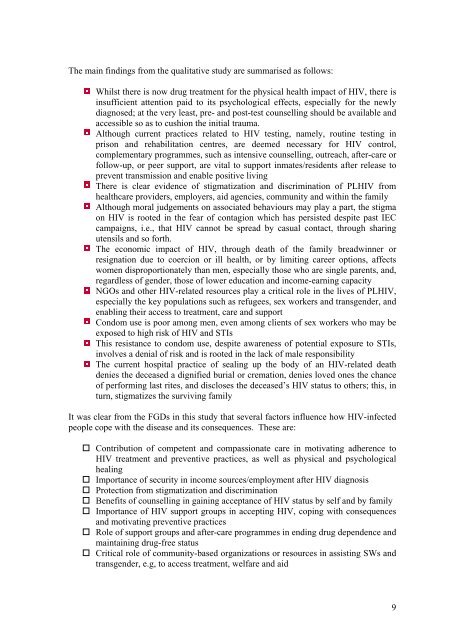Download this publication - AIDS Data Hub
Download this publication - AIDS Data Hub
Download this publication - AIDS Data Hub
You also want an ePaper? Increase the reach of your titles
YUMPU automatically turns print PDFs into web optimized ePapers that Google loves.
The main findings from the qualitative study are summarised as follows:Whilst there is now drug treatment for the physical health impact of HIV, there isinsufficient attention paid to its psychological effects, especially for the newlydiagnosed; at the very least, pre- and post-test counselling should be available andaccessible so as to cushion the initial trauma.Although current practices related to HIV testing, namely, routine testing inprison and rehabilitation centres, are deemed necessary for HIV control,complementary programmes, such as intensive counselling, outreach, after-care orfollow-up, or peer support, are vital to support inmates/residents after release toprevent transmission and enable positive livingThere is clear evidence of stigmatization and discrimination of PLHIV fromhealthcare providers, employers, aid agencies, community and within the familyAlthough moral judgements on associated behaviours may play a part, the stigmaon HIV is rooted in the fear of contagion which has persisted despite past IECcampaigns, i.e., that HIV cannot be spread by casual contact, through sharingutensils and so forth.The economic impact of HIV, through death of the family breadwinner orresignation due to coercion or ill health, or by limiting career options, affectswomen disproportionately than men, especially those who are single parents, and,regardless of gender, those of lower education and income-earning capacityNGOs and other HIV-related resources play a critical role in the lives of PLHIV,especially the key populations such as refugees, sex workers and transgender, andenabling their access to treatment, care and supportCondom use is poor among men, even among clients of sex workers who may beexposed to high risk of HIV and STIsThis resistance to condom use, despite awareness of potential exposure to STIs,involves a denial of risk and is rooted in the lack of male responsibilityThe current hospital practice of sealing up the body of an HIV-related deathdenies the deceased a dignified burial or cremation, denies loved ones the chanceof performing last rites, and discloses the deceased’s HIV status to others; <strong>this</strong>, inturn, stigmatizes the surviving familyIt was clear from the FGDs in <strong>this</strong> study that several factors influence how HIV-infectedpeople cope with the disease and its consequences. These are: Contribution of competent and compassionate care in motivating adherence toHIV treatment and preventive practices, as well as physical and psychologicalhealing Importance of security in income sources/employment after HIV diagnosis Protection from stigmatization and discrimination Benefits of counselling in gaining acceptance of HIV status by self and by family Importance of HIV support groups in accepting HIV, coping with consequencesand motivating preventive practices Role of support groups and after-care programmes in ending drug dependence andmaintaining drug-free status Critical role of community-based organizations or resources in assisting SWs andtransgender, e.g, to access treatment, welfare and aid9















